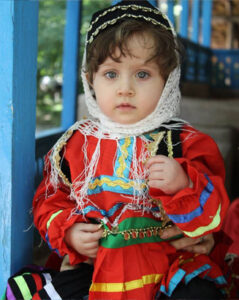With another successful adoption from Iran to the United States in 2022, A Family in Bloom Adoption will be accepting a select number of adoptive families to our agency’s program. Adoptions from Iran are a complex matter, even more so given the politically taught relationship between the two countries.
Our agency has found the international adoption process from Iran to be well founded and managed by the Iranian Adoption Authority in certain provinces. Extra time and efforts, involving additional communications and requests, are often needed to obtain the breadth and quality of child documentation from abroad to meet stringent US government requirements.
 A Family in Bloom Adoptions works with placements from orphanages supervised by Behzisti, Iran’s Welfare Organization. Management is handled at the provincial level, but overseen at the National level.
A Family in Bloom Adoptions works with placements from orphanages supervised by Behzisti, Iran’s Welfare Organization. Management is handled at the provincial level, but overseen at the National level.
Our agency will also work with appropriate kinship adoption cases, where the premise of the identified child relative(s) for international adoption are highly likely to meet the definition of US orphan status. Custodial placements as opposed to finalized adoptions are not situations our agency is comfortable working with for international adoptions from Iran.
Our agency does not work with privately arranged adoptions between parties, which includes pregnant birthmothers identified by prospective adoptive parents. Concerns about child trafficking add to the importance of accountability and legitimacy.
Given the lack of a physical US Embassy in Iran for decades, our adoptive families have been conducting the exit interviews at the US Embassy in Ankara, Turkey.
Traditionally, we have sent the post-adoption reports directly to the Iranian authorities. This can be up to four reports, at equal intervals over a two-year period.
Who Can Adopt

The main target group is:
- Iranian-American adoptive families, who have themselves emigrated from Iran.
- Fluency in languages of the region, Persian/Farsi and other specific regional languages for the Iranian province for adoption.
- Still have maintained strong cultural attachments to the country’s customs and can have family living abroad to be of assistance.
Below are the regulations posted on the US State Department’s Intercountry webpage about the international requirements for adoption from Iran:
In addition to U.S. immigration requirements, you must also meet the following requirements in order to adopt a child from Iran:
- Residency: Prospective adoptive parents who intend to acquire legal custody/guardianship for children in Iran must reside in Iran and they are required to be physically present in the country for fingerprinting and medical examinations. In addition, there is a six month probationary period and one of the parents may need to stay with the child during this period.
- Age of Adopting Parents: One of the prospective adoptive parents must be at least 30 years old.
- Marriage: The prospective adoptive couple must be married for at least five years with no children. Lesbian, Gay, Bisexual, and Transsexual couples/individuals cannot acquire legal custody/guardianship of an orphan in Iran. Single women can only obtain guardianship of female children in Iran. Single men cannot acquire legal custody/guardianship of children in Iran.
- Income: The prospective adoptive couple is expected to have sufficient financial capacity to support the child.
- Other: Muslim and Christian prospective adoptive couples must have no criminal records, no addiction to drugs or alcohol and no diseases that are difficult to cure. If the couple is able to submit a medical report to prove that at least one of the spouses is incapable of conceiving, the court may exempt them from the requirements of five years of marriage and one of the parents being at least 30 years old.
Iranian law allows a regional Family Affairs Branch Committee to waive requirements such as residency or age under exceptional circumstances.
Who Can Be Adopted
Iran has specific requirements that a child must meet in order to be eligible for legal guardianship (and adoption, sic agency):
- Relinquishment: The child’s father, paternal grandfather, and mother must all be either unknown or dead.
- Abandonment: The child must have been placed under the care of a public institution without any contact from any of the above listed relatives for three full years.
- Age of Adoptive Child: The child must be under 12 full years of age.
- Sibling Adoptions: None
- Special Needs or Medical Conditions: None
- Waiting Period or Foster Care: After consulting the institution or person in charge of the child’s temporary care, and prior to issuance of legal custody/guardianship approval, the court will place the child in the care of the prospective adoptive parents for a six-month probation period. During the probation period, the court may terminate the guardianship upon request from the Public Prosecutor, the National Society for the Protection of Children, or the institution where the child was previously under care, or on the basis of its own conclusion. Likewise, the prospective adoptive parents may declare that they have changed their minds during the probation period, in which case the court will terminate the legal custody/guardianship.
— Bruce Lee
About Iran
 Iran is home to one of the world’s oldest civilizations, first the highly developed Persian Empire and later under the Hellenistic influence. Consequently, archaeological and historical locations abound, as illustrated in the 26 UNESCO World Heritage sites. In the 7th seventh century A.D., Arabic Muslims conquered the region. The Islamic faith has remained the predominant religion of the Shiite variation. Geopolitically, Iran occupies a strategic location in Central Asia. The country’s extensive oil reserves have been the basis for economic clout. In this pluralistic society, there is a rich cultural backdrop of music, advanced handcrafts, and literature, particularly poetry should be mentioned. International sanctions and internal economic conditions have led to financial pressures on a segment of the population. One manifestation of international sanctions and internal economic conditions can affect the standard of living for a vulnerable segment of a country’s population. For all international adoption situations, children available for adoption will benefit from placement with their extended kin or other loving, permanent families.
Iran is home to one of the world’s oldest civilizations, first the highly developed Persian Empire and later under the Hellenistic influence. Consequently, archaeological and historical locations abound, as illustrated in the 26 UNESCO World Heritage sites. In the 7th seventh century A.D., Arabic Muslims conquered the region. The Islamic faith has remained the predominant religion of the Shiite variation. Geopolitically, Iran occupies a strategic location in Central Asia. The country’s extensive oil reserves have been the basis for economic clout. In this pluralistic society, there is a rich cultural backdrop of music, advanced handcrafts, and literature, particularly poetry should be mentioned. International sanctions and internal economic conditions have led to financial pressures on a segment of the population. One manifestation of international sanctions and internal economic conditions can affect the standard of living for a vulnerable segment of a country’s population. For all international adoption situations, children available for adoption will benefit from placement with their extended kin or other loving, permanent families.
Please contact us to learn more about our international adoption services.

